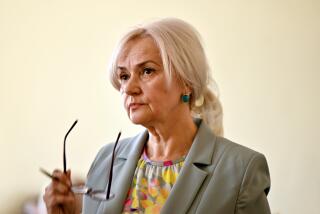A Shamed Russia Buries Slain Lawmaker
- Share via
ST. PETERSBURG, Russia — One of Russia’s rare democratic heroes, lawmaker Galina V. Starovoitova, was buried Tuesday in a moving ceremony marked by a palpable sense of shame that her assassination suggested just how thoroughly this country and its leaders have failed to live up to her principles.
“Forgive us, Galina Vasilyevna--we in power, your colleagues and friends--that we failed to protect you, to defend you from your enemies,” said Deputy Prime Minister Tatiana Matvienko, the official representative of President Boris N. Yeltsin at the solemn service for the liberal member of parliament.
Starovoitova’s violent death Friday appears to have mobilized new support for liberal causes and has forced many Russians, including those in power, to reflect painfully on the failings of Russian democracy.
“For me, this shows that those in power are unable to protect human life. Our government must find a way to be stronger than the criminals,” said Valery Davidov, a 46-year-old businessman who was among thousands of mourners waiting to pay their respects in a line that stretched deep into this city’s streets.
The guest list, including three former prime ministers, was a who’s who of Russian democrats: some in power, some out of power, many discredited and most divided among themselves.
But they were united in their praise of the 52-year-old Starovoitova as a fearless and uncompromising champion of democracy and freedom who wasn’t afraid to step on toes--especially Communist ones--and stuck to her principles when others had given up.
“We fought for freedom in a country that didn’t have freedom, but Galya went further than the rest of us,” said Sergei Mironov, who was a Starovoitova ally in the 1980s pro-democracy movement and is now acting speaker of the St. Petersburg assembly. “Thank you, Galya, for all you did for us, and forgive us if we weren’t always as attentive to you as you were to us.”
Many have suggested that her killing was an attempt by revanchist forces to silence a powerful critic and to cow the rest of the country into accepting a more authoritarian rule.
“Do they want to scare us?” asked a visibly distraught Anatoly B. Chubais, a St. Petersburg liberal whom many blame for the economy’s spectacular rise and subsequent fall. “We say clearly today over the coffin of our comrade: Whatever hands are trying to stop what has been achieved in our country will fail.”
Starovoitova was gunned down on the staircase to her apartment with an automatic rifle that left inch-deep bullet holes in the concrete walls. Her press secretary was seriously wounded and is still hospitalized.
The site has become an informal shrine, with mourners filing up the stairs, crossing themselves and reverently touching the holes with their fingers. Piles of flowers and pools of candle wax cover the traces of blood.
No suspects have been arrested, and police have said little about the investigation. A few people were detained for questioning, but no progress has been announced.
Starovoitova’s killing comes in a volatile political climate, with Yeltsin sick and sidelined and a succession struggle already underway. The economy has been on the skids for months, and the government seems at a loss for ideas on how to turn it around.
The killing is also the latest in a series of attacks that have angered and frightened Russians. About half a dozen public figures have been attacked in St. Petersburg in the last 18 months, three in the last two months. Contract killings are rarely solved.
The bloodshed and the political instability have generated a high level of anxiety in St. Petersburg and elsewhere, with many fearing more political violence.
“Nothing good can come from this,” said Boris Bragin, a businessman who made a pilgrimage to Starovoitova’s apartment. “The people who did this are capable of doing anything.”
In the absence of a culprit or motive, rumors are rife.
One set of theories focuses on Starovoitova’s activities in parliament’s lower house, the Duma, to which she was elected three years ago after a short stint in Yeltsin’s government in 1991. In the Duma, she was a relentless, sharp-tongued critic of the Communists and their allies. As a champion of ethnic minorities, she had vociferously criticized recent anti-Semitic comments by Communist deputies.
A second set of speculations suggests Starovoitova was the victim of a nasty battle for control of the St. Petersburg city government. The assassination came 10 days before elections to the city assembly, and the campaign has been one of the dirtiest on record.
For instance, “doubles” have appeared on ballots--unknown people who just happen to have the same name as previously registered candidates. New parties have also been registered that have names nearly identical to existing parties so voters choosing by party affiliation are likely to be confused. Some voters have been getting intimidating 3 a.m. phone calls urging them to vote for certain candidates.
Starovoitova had formed a coalition, called Northern Capital, to try to unify democratic candidates from various parties, and some of her allies say they had a decent chance of gaining ground.
“When it became clear that Northern Capital was doing well, that’s when the threats against her began,” said Viktor Krivulin, a poet, candidate and close Starovoitova aide.
Regardless of its cause, Starovoitova’s killing appears to be shaking many people out of apathy. St. Petersburg’s fractured democratic parties have responded by forming a unified front for the elections, and Chubais announced that a similar national alliance is in the works.
“The best response to this event is to unify the democratic forces,” said Mikhail I. Amosov, a local leader of the Yabloko party.
More to Read
Sign up for Essential California
The most important California stories and recommendations in your inbox every morning.
You may occasionally receive promotional content from the Los Angeles Times.










